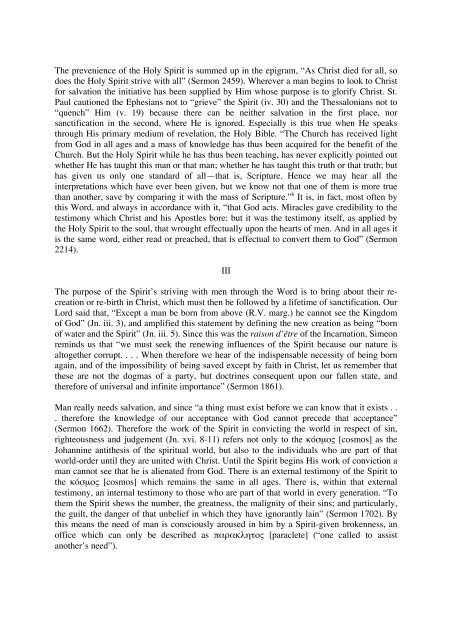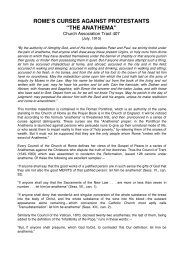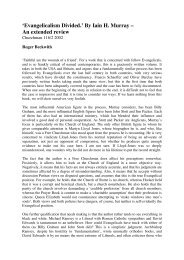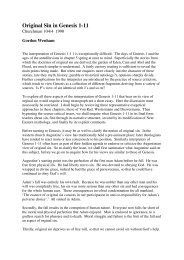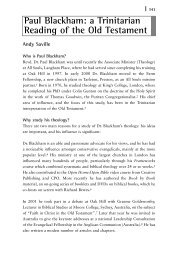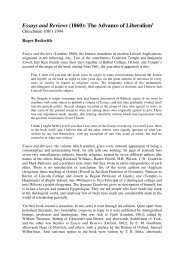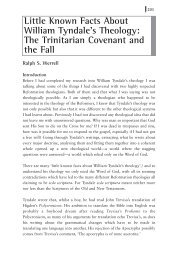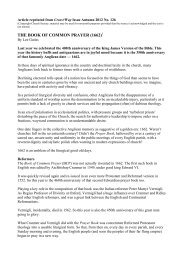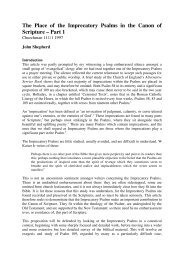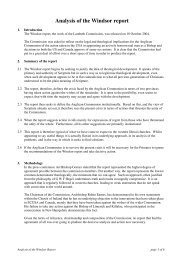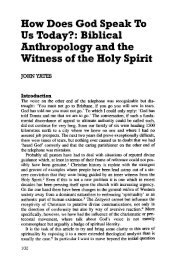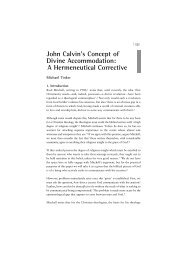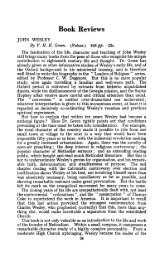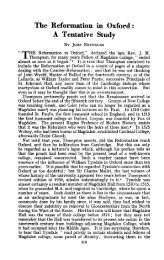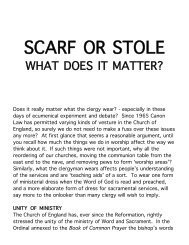The Holy Spirit in the Teaching of Charles Simeon - Church Society
The Holy Spirit in the Teaching of Charles Simeon - Church Society
The Holy Spirit in the Teaching of Charles Simeon - Church Society
You also want an ePaper? Increase the reach of your titles
YUMPU automatically turns print PDFs into web optimized ePapers that Google loves.
<strong>The</strong> prevenience <strong>of</strong> <strong>the</strong> <strong>Holy</strong> <strong>Spirit</strong> is summed up <strong>in</strong> <strong>the</strong> epigram, “As Christ died for all, so<br />
does <strong>the</strong> <strong>Holy</strong> <strong>Spirit</strong> strive with all” (Sermon 2459). Wherever a man beg<strong>in</strong>s to look to Christ<br />
for salvation <strong>the</strong> <strong>in</strong>itiative has been supplied by Him whose purpose is to glorify Christ. St.<br />
Paul cautioned <strong>the</strong> Ephesians not to “grieve” <strong>the</strong> <strong>Spirit</strong> (iv. 30) and <strong>the</strong> <strong>The</strong>ssalonians not to<br />
“quench” Him (v. 19) because <strong>the</strong>re can be nei<strong>the</strong>r salvation <strong>in</strong> <strong>the</strong> first place, nor<br />
sanctification <strong>in</strong> <strong>the</strong> second, where He is ignored. Especially is this true when He speaks<br />
through His primary medium <strong>of</strong> revelation, <strong>the</strong> <strong>Holy</strong> Bible. “<strong>The</strong> <strong>Church</strong> has received light<br />
from God <strong>in</strong> all ages and a mass <strong>of</strong> knowledge has thus been acquired for <strong>the</strong> benefit <strong>of</strong> <strong>the</strong><br />
<strong>Church</strong>. But <strong>the</strong> <strong>Holy</strong> <strong>Spirit</strong> while he has thus been teach<strong>in</strong>g, has never explicitly po<strong>in</strong>ted out<br />
whe<strong>the</strong>r He has taught this man or that man; whe<strong>the</strong>r he has taught this truth or that truth; but<br />
has given us only one standard <strong>of</strong> all—that is, Scripture. Hence we may hear all <strong>the</strong><br />
<strong>in</strong>terpretations which have ever been given, but we know not that one <strong>of</strong> <strong>the</strong>m is more true<br />
than ano<strong>the</strong>r, save by compar<strong>in</strong>g it with <strong>the</strong> mass <strong>of</strong> Scripture.” 6 It is, <strong>in</strong> fact, most <strong>of</strong>ten by<br />
this Word, and always <strong>in</strong> accordance with it, “that God acts. Miracles gave credibility to <strong>the</strong><br />
testimony which Christ and his Apostles bore: but it was <strong>the</strong> testimony itself, as applied by<br />
<strong>the</strong> <strong>Holy</strong> <strong>Spirit</strong> to <strong>the</strong> soul, that wrought effectually upon <strong>the</strong> hearts <strong>of</strong> men. And <strong>in</strong> all ages it<br />
is <strong>the</strong> same word, ei<strong>the</strong>r read or preached, that is effectual to convert <strong>the</strong>m to God” (Sermon<br />
2214).<br />
III<br />
<strong>The</strong> purpose <strong>of</strong> <strong>the</strong> <strong>Spirit</strong>’s striv<strong>in</strong>g with men through <strong>the</strong> Word is to br<strong>in</strong>g about <strong>the</strong>ir recreation<br />
or re-birth <strong>in</strong> Christ, which must <strong>the</strong>n be followed by a lifetime <strong>of</strong> sanctification. Our<br />
Lord said that, “Except a man be born from above (R.V. marg.) he cannot see <strong>the</strong> K<strong>in</strong>gdom<br />
<strong>of</strong> God” (Jn. iii. 3), and amplified this statement by def<strong>in</strong><strong>in</strong>g <strong>the</strong> new creation as be<strong>in</strong>g “born<br />
<strong>of</strong> water and <strong>the</strong> <strong>Spirit</strong>” (Jn. iii. 5). S<strong>in</strong>ce this was <strong>the</strong> raison d’être <strong>of</strong> <strong>the</strong> Incarnation, <strong>Simeon</strong><br />
rem<strong>in</strong>ds us that “we must seek <strong>the</strong> renew<strong>in</strong>g <strong>in</strong>fluences <strong>of</strong> <strong>the</strong> <strong>Spirit</strong> because our nature is<br />
altoge<strong>the</strong>r corrupt. . . . When <strong>the</strong>refore we hear <strong>of</strong> <strong>the</strong> <strong>in</strong>dispensable necessity <strong>of</strong> be<strong>in</strong>g born<br />
aga<strong>in</strong>, and <strong>of</strong> <strong>the</strong> impossibility <strong>of</strong> be<strong>in</strong>g saved except by faith <strong>in</strong> Christ, let us remember that<br />
<strong>the</strong>se are not <strong>the</strong> dogmas <strong>of</strong> a party, but doctr<strong>in</strong>es consequent upon our fallen state, and<br />
<strong>the</strong>refore <strong>of</strong> universal and <strong>in</strong>f<strong>in</strong>ite importance” (Sermon 1861).<br />
Man really needs salvation, and s<strong>in</strong>ce “a th<strong>in</strong>g must exist before we can know that it exists . .<br />
. <strong>the</strong>refore <strong>the</strong> knowledge <strong>of</strong> our acceptance with God cannot precede that acceptance”<br />
(Sermon 1662). <strong>The</strong>refore <strong>the</strong> work <strong>of</strong> <strong>the</strong> <strong>Spirit</strong> <strong>in</strong> convict<strong>in</strong>g <strong>the</strong> world <strong>in</strong> respect <strong>of</strong> s<strong>in</strong>,<br />
righteousness and judgement (Jn. xvi. 8-11) refers not only to <strong>the</strong> κóσµος [cosmos] as <strong>the</strong><br />
Johann<strong>in</strong>e anti<strong>the</strong>sis <strong>of</strong> <strong>the</strong> spiritual world, but also to <strong>the</strong> <strong>in</strong>dividuals who are part <strong>of</strong> that<br />
world-order until <strong>the</strong>y are united with Christ. Until <strong>the</strong> <strong>Spirit</strong> beg<strong>in</strong>s His work <strong>of</strong> conviction a<br />
man cannot see that he is alienated from God. <strong>The</strong>re is an external testimony <strong>of</strong> <strong>the</strong> <strong>Spirit</strong> to<br />
<strong>the</strong> κóσµος [cosmos] which rema<strong>in</strong>s <strong>the</strong> same <strong>in</strong> all ages. <strong>The</strong>re is, with<strong>in</strong> that external<br />
testimony, an <strong>in</strong>ternal testimony to those who are part <strong>of</strong> that world <strong>in</strong> every generation. “To<br />
<strong>the</strong>m <strong>the</strong> <strong>Spirit</strong> shews <strong>the</strong> number, <strong>the</strong> greatness, <strong>the</strong> malignity <strong>of</strong> <strong>the</strong>ir s<strong>in</strong>s; and particularly,<br />
<strong>the</strong> guilt, <strong>the</strong> danger <strong>of</strong> that unbelief <strong>in</strong> which <strong>the</strong>y have ignorantly la<strong>in</strong>” (Sermon 1702). By<br />
this means <strong>the</strong> need <strong>of</strong> man is consciously aroused <strong>in</strong> him by a <strong>Spirit</strong>-given brokenness, an<br />
<strong>of</strong>fice which can only be described as παρακλητος [paraclete] (“one called to assist<br />
ano<strong>the</strong>r’s need”).


